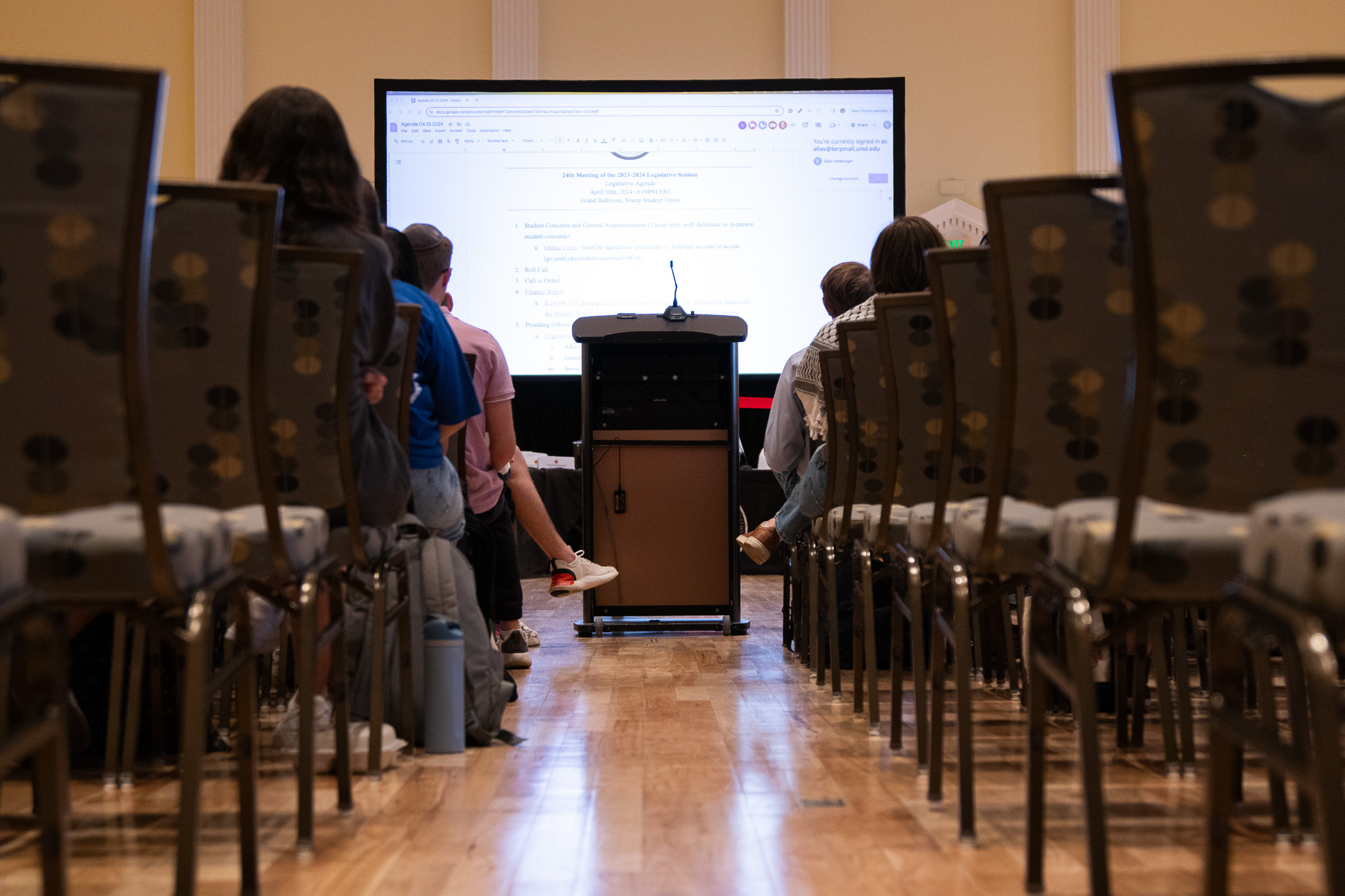By Sam Gauntt and Natalie Weger
The University of Maryland SGA’s student affairs committee voted against a resolution urging the university to divest from “companies engaged in human rights violations” during a Thursday meeting.
If passed, the resolution would call on the University System of Maryland Foundation, which manages the university system’s financial assets, and this university’s administration to withdraw investments from companies that do not adhere to United Nations Global Compact standards. The compact stipulates that companies’ investments align with universal human rights, labor, environment and anti-corruption principles, according to the United Nations.
The resolution had its first reading before the Student Government Association’s general body on Wednesday. Before that meeting, the resolution was referred to the SGA’s student affairs committee for consideration.
In a statement to The Diamondback, this university said the SGA debate on the divestment resolution will have “no bearing on university policy or practice.”
More than 50 students attended Thursday’s committee meeting, including student body president Alexandra DeBus, who said divestment is not a constructive solution.
“I’m disappointed in the dangerous rhetoric, political and moral posturing, as well as the weaponization of identity politics that I’ve witnessed over the past few weeks,” DeBus, a senior biochemistry major, said during the meeting.
The resolution will come with an unfavorable primary committee report when it’s presented to the general body on Wednesday. It will need a two-thirds majority vote in the SGA’s legislature to overturn the unfavorable ruling and allow the legislature to vote on it, according to Abel Amene, the resolution’s sponsor and a senior economics and physics major.
[UMD students supporting Palestine protest Israeli politician’s talk]
Conversations about divestment at this university resurfaced amid recent violence in Israel and Palestine. Hamas killed at least 1,200 people and took about 250 hostages from Israel in an Oct. 7, 2023, attack and Israel declared war on Hamas the next day, the Associated Press reported. More than 33,000 people in Palestine have been killed since October, the Associated Press reported April 14.
Several university community members spoke about the resolution during a public comment session at Thursday’s committee meeting.
Diana Rivera, a senior information science major and president of Political Latinx United for Movement and Action in Society at this university, emphasized that the resolution does not target a specific group.
“As representatives at a university that claims to uphold accountability and display transparency when mistakes are made, I would like you to take into account how divestment aligns with those values,” Rivera said during the resolution’s public testimony. “Everyone should question their complicity in this.”
Taylor Faust, a sophomore criminology major, said other countries’ inclusion in the resolution “attempts to obscure” its focus on Israel. The resolution will divide students on campus, Faust added.
“I wish that this bill helped people suffering. Instead, this bill uses the disguise of human rights to demonize Israel and ostracize Jewish students on campus,” Faust said during Thursday’s meeting.
[UMD community urges university to reconsider ties with Maryland prison labor system]
A petition against the divestment resolution has more than a dozen endorsements from organizations such as the Chabad, Hillel and Meor Jewish student organizations. The petition calls the divest movement “antisemetic, harmful and dangerous” and says it “threatens the safety of Jewish students on campus.”
Rifka Handelman, a junior environmental science and policy major and member of this university’s Jewish Voice for Peace chapter, said divestment should not be controversial.
“I’m very disappointed in the SGA for not properly representing the student body,” Handelman told The Diamondback Thursday. “It’s been clear that this is not only something that’s not very complicated, but that the student body supports.”
Some students Wednesday also expressed frustration over the resolution’s placement in the student affairs committee, which limited who could vote on it.
Only active SGA members who had attended at least half of the student affairs committee meetings since the start of the committee directors’ terms — or since the start of their own terms if appointed after the committee directors — could vote on the resolution Thursday, according to student affairs director Ethan Vinodh.
The resolution’s secondary committee is civic and governmental affairs and its tertiary committee is diversity and inclusion. Neither committee requires students to be SGA members to vote.
More than 100 students have attended meetings of both committees this month to meet their requirements for allowing students to vote. Both committees will hear the resolution on Monday.
“We cooperated with you, attended committee meetings for weeks, remained respectful and worked within the restraints you gave us because we thought you’d have the decency to put the resolution on the floor for a vote,” Hershel Barnstein, this university’s Jewish Voice for Peace chapter president and a senior biology major, said during student testimony at Wednesday’s general body meeting.
Amene, an off-campus outlying representative for the SGA, said at Wednesday’s general body meeting that assigning the resolution to a committee that is “in essence closed” was “undemocratic.”
The SGA previously discussed bills calling for divestment in 2017 and 2019, which were assigned to the student affairs committee, DeBus said. This university’s divestments from certain companies should be considered a campus affair, she told The Diamondback.
The divestment bills failed to pass in both years.



